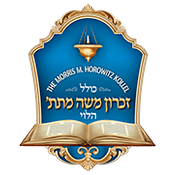Parshas Beha’aloscha 1


׳׳ויאמר אהרן אל משה בי אדני אל נא תשת עלינו חטאת אשר נואלנו ואשר חטאנו׳׳ במדבר יב:יא
“And Aharon said to Moshe, please my master, do not hold a sin over us for we have been foolish and we have sinned”
Bamidbar 12:11
The ילקוט cryptically states that Aharon was asking Moshe that if he and Miriam had sinned unintentionally that they should be forgiven as if they had sinned intentionally. The שב שמעתתא in his הקדמה explains this request of Aharon HaKohen. If Aharon and Miriam did not actually understand the level that their brother Moshe Rabbeinu was on, this would be considered a tremendous חטא in front of Hashem. Aharon should have understood that Hashem would not pay Moshe Rabbeinu special attention without reason. If Hashem was interacting with Moshe Rabbeinu in such a fashion, it must have been because Moshe was on an extremely high level. On the other hand, if they did indeed understand the greatness of Moshe, then their sin was against Moshe for purposely slandering him despite their knowledge of the level he had attained, even if their חטא against Hashem would have been minimized.
This is why they cried before Moshe; if we have sinned unintentionally, for we did not understand your greatness, then our sin will be magnanimous before Hashem. Therefore, please forgive us as if we have sinned intentionally and give in on your honor as if we intentionally sinned against you, Moshe, in order that our sin shall be minimized before Hashem. (For indeed it would be possible for Moshe to be מוחל on his כבוד as opposed to giving in on the honor of Hashem.)
We see from here the importance of giving כבוד where כבוד is due. We may be held responsible in the eyes of Hashem – בין אדם למקום, for not understanding the greatness of Talmidei Chachamim. There is an aspect of בין אדם לחבירו as well, which is the obligation to properly respect a person who is truly deserving of such respect. There are people out there in our world today who have worked on and refined themselves by toiling in the Torah to an incredible degree. We are meant to discern these Gedolim, and respect them for both their own honor and the honor of Hashem. By doing so we may be zoche to greet “Tzemach” as mentioned in the הפטרה.
The Navi Zechariah prophesied, that Hashem will bring His servant, “ צמח ”, at the appropriate time. The Malbim explains that this is referring to משיח (see רד׳׳ק ). The reason Moshiach is referred to here as “Tzemach” (literally, sprouting) is because even though it may appear nowadays that all remnants of מלכות בית דוד , The Kingdom of David, have been cut down, we should know that the root of his kingdom is still alive and well, albeit hidden from our eyes. When the time arrives, Moshiach will sprout on his own and reveal himself to us all. Just as the seed of a tree lies hidden deep in the ground until the time arrives for it to flower and sprout before a great fruit-bearing tree is born. משיח is here and to be found and will reveal himself when Hashem brings about his time.
Moshe Rothenberg / MMHK
